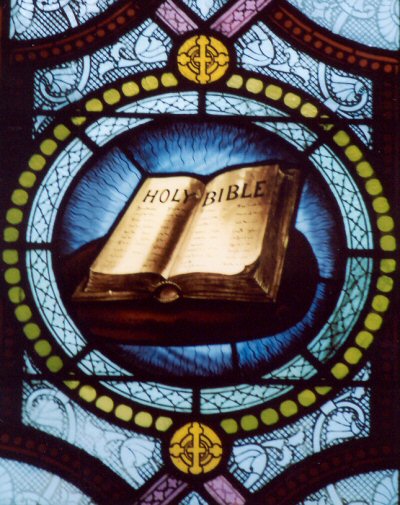
Liturgy of the Word
Twenty-fourth Sunday in Ordinary Time
September 17, 2017 Cycle A
Green priestly vestments symbolize hope and the vitality of
the life of faith.
Home Page
Liturgical
Year Cycle A 2016-2017
Introductory Acts Of Worship
The Entrance Prayers:
On Sunday, usually a hymn praising God
is sung in place of reciting a Psalm from the Bible which invites us to
enter more deeply into the mystery of God's love for us. The recited
weekday Psalm expresses a youthful heart and spirit, delighted that we may come
before the living God.
Entrance Song
/ Entrance Psalm (Antiphon)
Entrance Song Sirach 36:18
Give peace, Lord, to those who
wait for you and your prophets will proclaim you as you deserve. Hear the
prayers of your servant and of your people Israel.
The Priest Approaches and Kisses the Altar: The altar is a symbol of Christ. In it are cut five crosses to recall the five wounds of Christ. The altar also represents the Church and has embedded in it the relics of her saints. The priest comes to the altar to celebrate the Sacrifice in the Church's name. Because of the glory surrounding the altar upon which the divine Sacrifice will be made, the kiss of the priest unites the Church to Christ, its Redeemer.
Priest:
In the name of the Father, and of the Son, and of the Holy Spirit.
All:
Amen.
The Greeting: We are welcomed in God's name. Our response unites us to our neighbor, to the priest and to God. (The priest may select from several forms of greeting).
Priest:
Grace to you and peace from God our Father and the Lord Jesus Christ.
All:
And with your spirit.
The Penitential Prayers:
We recognize our guilt for past sins,
express our sorrow for them, and ask that Mary, the angels, the saints, and our
brothers and sisters in Christ pray for the Lord God's mercy. (The priest
may select from several forms).
Priest: Brothers and sisters, let us
acknowledge our sins, and so prepare ourselves to celebrate the sacred
mysteries.
Priest: Have mercy on us, O Lord.
All: For we have sinned against you.
Priest: Show us, O Lord, your mercy.
All: And grant us your salvation.
The Absolution:
Priest: May almighty God have
mercy on us, forgive us our sins, and bring us to everlasting life.
All:
Amen.
The Gloria: The Glory of God prayers have existed from the second century. They repeat the angels praise of God which heralded the birth of Christ on earth. Our praise is lifted again through the years as we rejoice at His coming as Lord, God, the most high Jesus Christ, who at Christmas took on our human nature while at the same time being the son of Man. This ancient hymn expresses our recognition of God's glory and love. It calls upon Christ as our holy and divine mediator, and the Holy Spirit who forever binds us together in God's love.
Priest and All: Glory to God in the highest, and peace to his people on earth. Lord God, heavenly King, almighty God and Father, we worship you, we give you thinks, we praise you for your glory. Lord Jesus Christ, only son of the Father, Lord God, Lamb of God, you take away the sins of the world: have mercy on us; you are seated at the right hand of the Father: receive our prayer. For you alone are the Holy One, you alone are the Lord, you alone are the Most High, Jesus Christ, with the Holy Spirit, in the glory of God the Father. Amen.
The Collect: The priest lifts the united prayers and petitions of the congregation to God the Father through the merits of Jesus Christ in the Holy Spirit.
Priest: Let us pray. Look upon us, O God, Creator and
ruler of all things, and, that we may feel the working of your mercy, grant that
we may serve you with all our heart. Through our Lord Jesus Christ, your
Son, who lives and reigns with you in the unity of the Holy Spirit, one God, for ever and ever.

Liturgy of the Word
Christ is made known to us through the
Old Testament which prepares us to recognize Him. In those days, God
inspired men who spoke His message. Now, the New Testament Gospel reading
announces His presence to us directly through His Son. Both
readings bring God's message to us. Our responsibility is to respond.
The First Reading:
From the Old Testament
Priest/Reader: A reading from the
prophet Sirach.
Sirach 27:30-28:7
Wrath and anger are hateful things, yet the sinner hugs them tight. The vengeful will suffer the Lord’s vengeance, for he remembers their sins in detail. Forgive your neighbor’s injustice; then when you pray, your own sins will be forgiven. Could anyone nourish anger against another and expect healing from the Lord? Could anyone refuse mercy to another like himself, can he seek pardon for his sins? If one who is but flesh cherishes wrath, who will forgive his sins? Remember your last days, set enmity aside; remember death and decay, and cease from sin! Think of the commandments, hate not your neighbor; remember the Most High’s covenant, and overlook faults.
Priest/Reader:
The Word of the
Lord.
All:
Thanks
be to God.
The Responsorial Psalm:
This Psalm praising God, is a prayer to God,
or recommends the practice of virtue. It is sung as an interlude between
the scriptural readings. It provides yet another instructional setting and
invites the assembly to imitate the cantor who sings a repeated response to the
verses of an ancient Psalm many of which are attributed to King David. The
verses are sung first by a cantor (song leader) accompanied by instruments, the
refrain is sung by the people.
Psalm 103:8; 103:1-2, 3-4, 9-10, 11-12
Cantor: The Lord is kind and merciful, slow to anger, and rich in
compassion.
All: The
Lord is kind and merciful, slow to anger, and rich in compassion.
Cantor: Bless the Lord, O my soul; and all my being, bless his holy
name. Bless the Lord, O my soul, and forget not all his benefits.
All: The
Lord is kind and merciful, slow to anger, and rich in compassion.
Cantor: He pardons all your iniquities, heals all your ills. He
redeems your life from destruction, crowns you with kindness and compassion.
All: The
Lord is kind and merciful, slow to anger, and rich in compassion.
Cantor:
He will not always chide, nor does he
keep his wrath forever. Not according to our sins does he deal with us, nor
does he requite us according to our crimes.
All: The
Lord is kind and merciful, slow to anger, and rich in compassion.
Cantor: For as the heavens are high above the earth, so surpassing
is his kindness toward those who fear him. As far as the east is from the west,
so far has he put our transgressions from us.
All: The
Lord is kind and merciful, slow to anger, and rich in compassion.
The Second Reading: Taken from the New Testament, often from a letter written by St. Paul.
Second Reading: Romans 14:7-9
Brothers and sisters: None of us lives for oneself, and no one dies for
oneself. For if we live, we live for the Lord, and if we die, we die for the
Lord; so then, whether we live or die, we are the Lord’s. For this is why
Christ died and came to life, that he might be Lord of both the dead and the
living.
Priest/Reader: The
word of the Lord.
All: Thanks
be to God.
The Alleluia: An ancient expression of joy anticipating the Lord's message we will hear in the Gospel.
John 6:64-69
Cantor: Alleluia!
Alleluia! Alleluia!
All: R/. Alleluia! Alleluia! Alleluia!
Cantor: Your words, O Lord, are spirit and life; you have
the words of everlasting life.
All: R/. Alleluia! Alleluia! Alleluia!
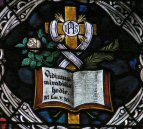 The Gospel:
The Liturgy of the Word is completed
by the reading of the Gospel. Before its reading, the members of the
assembly trace the sign of the cross upon the forehead to indicate their mental
acceptance of the Truth, on the lips to indicate their readiness to announce it,
and over the heart to indicate their sincere desire to accept it into their
lives. The "Good News" of the Gospel tells that God's kingdom has come for
all to hear, accept, and announce to the world for its salvation. It
is God who is speaking to us. Christ comes to teach us by the example of
His life and by His own words.
The Gospel:
The Liturgy of the Word is completed
by the reading of the Gospel. Before its reading, the members of the
assembly trace the sign of the cross upon the forehead to indicate their mental
acceptance of the Truth, on the lips to indicate their readiness to announce it,
and over the heart to indicate their sincere desire to accept it into their
lives. The "Good News" of the Gospel tells that God's kingdom has come for
all to hear, accept, and announce to the world for its salvation. It
is God who is speaking to us. Christ comes to teach us by the example of
His life and by His own words.
Priest: Cleanse my heart and my lips, almighty God, that I may worthily proclaim your
holy Gospel. Through the words of the Gospel may our sins be wiped away.
Priest: The Lord be with you.
All: And
also with you.
Priest/Deacon: A
reading from the holy Gospel according
to Matthew.
All: Glory
to you, Lord.
The Gospel: Matthew 18:21-35
Matthew wrote to show that Christ
was the
Messiah and fulfilled the Jewish prophecies.
 Peter approached Jesus and
asked him, “Lord, if my brother sins against me, how often must I forgive? As
many as seven times?” Jesus answered, “I say to you, not seven times but
seventy-seven times. That is why the kingdom of heaven may be likened to a king
who decided to settle accounts with his servants. When he began the accounting,
a debtor was brought before him who owed him a huge amount. Since he had no way
of paying it back, his master ordered him to be sold, along with his wife, his
children, and all his property, in payment of the debt. At that, the servant
fell down, did him homage, and said, ‘Be patient with me, and I will pay you
back in full.’ Moved with compassion the master of that servant let him go and
forgave him the loan. When the servant had left, he found one of his fellow
servants who owed him a much smaller amount. He seized him and started to choke
him, demanding, ‘Pay back what you woe.’ Falling to his knees, his fellow
servant begged him, ‘Be patient with me, and I will pay back.’ But he refused.
Instead, he had the fellow servant put in prison until he paid back the debt.
Now when his fellow servants saw what had happened, they were deeply disturbed,
and went to their master and reported the whole affair. His master summoned him
and said to him, ‘You wicked servant! I forgave you your entire debt because
you begged me to. Should you not have had pity on your fellow servant, as I had
pity on you?’ Then in anger his master handed him over to the torturers until
he should pay back the whole debt. So will my heavenly Father do to you, unless
each of you forgives your brother from your heart.”
Peter approached Jesus and
asked him, “Lord, if my brother sins against me, how often must I forgive? As
many as seven times?” Jesus answered, “I say to you, not seven times but
seventy-seven times. That is why the kingdom of heaven may be likened to a king
who decided to settle accounts with his servants. When he began the accounting,
a debtor was brought before him who owed him a huge amount. Since he had no way
of paying it back, his master ordered him to be sold, along with his wife, his
children, and all his property, in payment of the debt. At that, the servant
fell down, did him homage, and said, ‘Be patient with me, and I will pay you
back in full.’ Moved with compassion the master of that servant let him go and
forgave him the loan. When the servant had left, he found one of his fellow
servants who owed him a much smaller amount. He seized him and started to choke
him, demanding, ‘Pay back what you woe.’ Falling to his knees, his fellow
servant begged him, ‘Be patient with me, and I will pay back.’ But he refused.
Instead, he had the fellow servant put in prison until he paid back the debt.
Now when his fellow servants saw what had happened, they were deeply disturbed,
and went to their master and reported the whole affair. His master summoned him
and said to him, ‘You wicked servant! I forgave you your entire debt because
you begged me to. Should you not have had pity on your fellow servant, as I had
pity on you?’ Then in anger his master handed him over to the torturers until
he should pay back the whole debt. So will my heavenly Father do to you, unless
each of you forgives your brother from your heart.”
Priest/Deacon: The Gospel of the Lord.
All: Praise
to you, Lord Jesus Christ.
The Priest's Sermon:
The priest develops, explains, and comments upon the Master's words,
so our minds may be
enlightened, and our
hearts enriched.
(A priestly reflection upon this Gospel)
General Intercessions: We pray for the needs of the pope, civic leaders, our own needs, those of others, the sick, the dying, those who have died, the church, and the world. The response of all to each intercession: Lord, hear our prayer.
All: Lord,
hear our prayer.
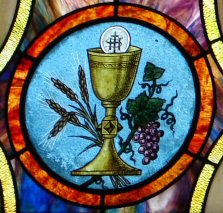 The Liturgy of the Eucharist
The Liturgy of the Eucharist
Gifts of bread and wine symbolizing ourselves are presented to the priest who will offer them to God the Father. Through the Holy Spirit, they will become the Body and Blood of Jesus Christ whom we receive in Holy Communion. Jesus unites Himself with us for our spiritual nourishment and strength. Today, when individuals do not present their own personal offerings of bread and wine, the monetary contribution symbolizes the material of their united sacrifice.
Preparation of the Bread and Wine:
Priest: Blessed are you, Lord, God of all creation, for through your goodness we have
received the bread we offer you;
fruit of the earth and work of human hands, it will become for us the bread of life.
All:
Blessed be God for ever.
Priest: By the mystery of this water and wine may we come to
share in the divinity of Christ, who humbled himself to share
in our humanity.
Priest: Blessed are you, Lord God of all creation, for through your goodness we have
received the wine we offer you; fruit
of the vine and work of human hands it will become our spiritual drink.
All: Blessed be God for ever.
Priest: Lord God, we ask you to receive us and be pleased with the sacrifice we offer you with humble and contrite hearts.
The Priest's Hands are Washed: This act was traditional necessary because the priest handled the various gifts presented by the people. Now, the cleansing act using water reminds the priest and ourselves of the need to cleanse not only the hands but the soul. Soon, the priest's hands will hold the actual body of Christ, and we will become His dwelling place.
Priest: Lord,
wash away my iniquity; cleanse me from my sin.
Pray, brethren, that
my sacrifice and yours may be acceptable to God, the almighty Father.
All: May the Lord accept the sacrifice at your hands, for the praise and glory of his
name, for our good, and the good of all his holy Church.
Prayer over the Gifts: Speaking in our name, the priest asks the Father to accept the gifts we offer through him.
Priest: Lord, hear the prayers of your people and receive our gifts. May the worship of each one here bring salvation to all. Grant this through Christ our Lord.
Eucharistic Prayer: (Number Four: The priest may select from several forms).
Priest: The Lord be with you.
All: And also with you.
Priest: Lift up your hearts.
All: We lift them up to the Lord.
Priest: Let us give thanks to the Lord, our God.
All: It is right to
give him thanks and praise.
Preface Prayer:
Priest: It is truly right t give you thanks, truly just to give you glory, Father most holy, for you are the one God living and true, existing before all ages and abiding for all eternity, dwelling in unapproachable light; yet you, who alone are good, the source of life, have made all that is, so that you might fill your creatures with blessings and bring joy to many of them by the glory of your light.
And so, in your presence are countless hosts of Angels, who serve you day and night and, gazing upon the glory of your face, glorify you without ceasing.
With them we, too, confess your name in exultation, giving voice to every creature under heaven, as we acclaim:
Acclamation:
Priest / All: Holy, Holy, Holy Lord, God of hosts. Heaven and earth are full of your glory. Hosanna in the highest. Blessed is he who comes in the name of the Lord. Hosanna in the highest.
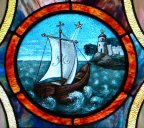
Priest: We give you praise, Father most holy, for you are great and you have fashioned all your works in wisdom and in love. You formed man in your own image and entrusted the whole world to his care, so that in serving you alone, the Creator, he might have dominion over all creatures. And when through disobedience he had lost your friendship, you did not abandon him to the domain of death. For you came in mercy to the aid of all, so that those who seek might find you. Time and again you offered them covenants and through the prophets taught them to look forward to salvation.
And you so loved the world, Father most holy, that in the fullness of time you sent your Only Begotten Son to be our Savior. Made incarnate by the Holy Spirit and born of the Virgin Mary, he shared our human nature in all things but sin. To the poor he proclaimed the good news of salvation, to prisoners, freedom, and to the sorrowful of heart, joy. To accomplish your plan, he gave himself up to death, and, rising from the dead, he destroyed death and restored life.
And that we might live no longer for ourselves but for him who died and rose again for us, he sent the Holy Spirit from you, Father, as the first fruits for those who believe, so that, bringing to perfection his work in the world, he might sanctify creation to the full.
Therefore, O Lord, we pray: may this same Holy Spirit graciously sanctify these offerings, that they may become the Body and Blood of our Lord Jesus Christ for the celebration of this great mystery, which he himself left us as an eternal covenant.
The priest repeats the words which Christ used at his Last Supper when He changed the bread into His Body and the wine into His Blood. His Body and Blood are truly present but under the appearance of bread and wine. The death of Christ is prolonged in each of those who receive Him worthily. We apply His death to ourselves so that we may share His glory. This moment is the most solemn on earth because it is Divine act which enables us to apply to ourselves the Cross which Christ willingly took upon Himself.
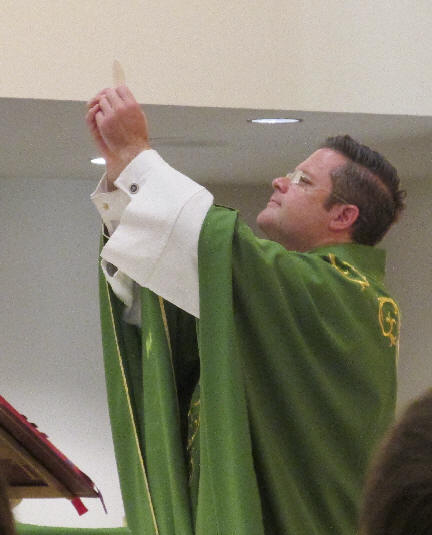 We are called to die to sin and
lift our very selves to God so that we become changed; to do as God would have
us do, to become what God would have us become. Our own little cross can
lift us into union with Christ's Cross so we may earn the joys of everlasting
happiness with God the Father.
We are called to die to sin and
lift our very selves to God so that we become changed; to do as God would have
us do, to become what God would have us become. Our own little cross can
lift us into union with Christ's Cross so we may earn the joys of everlasting
happiness with God the Father.
The
Lord's Supper:
While they were at supper, he took bread,
said the blessing, broke the bread, and gave it to his disciples, saying:
Take this, all of
you and eat of it: for this is my Body which will be given up for you.
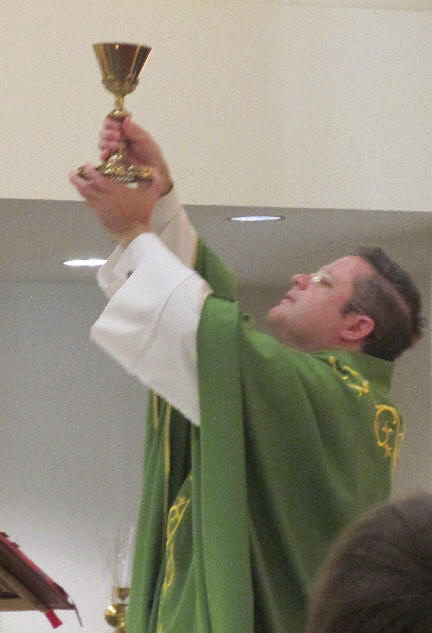 In
the same way, he took the cup filled with wine. He gave you thanks, and
giving the cup to his disciples, and said:
In
the same way, he took the cup filled with wine. He gave you thanks, and
giving the cup to his disciples, and said:
Take this, all of you, and drink from it; for this is the chalice of my
Blood, the Blood of the new and eternal covenant; which will be poured out for you and for many for the
forgiveness of sins. Do this in memory of me.
Memorial Acclamation: (The priest may select from several forms).
Priest:
Let us proclaim the mystery of faith.
Priest and All: We proclaim your Death, O Lord, and profess your
Resurrection until you come again.
Memorial Acclamation: (The priest may select from several forms).
Priest: Therefore, O Lord, as we now celebrate the memorial of our redemption, we remember Christ's Death and his descent to the realm of the dead, we proclaim his Resurrection and his Ascension to your right hand, and, as we await his coming in glory, we offer you his body and Blood, the sacrifice acceptable to you which brings salvation to the whole world.
 Look, O Lord, upon the Sacrifice which you
yourself have provided for your Church, and grant in your loving kindness to all
who partake of this one Bread and one Chalice that, gathered into one body by
the Holy Spirit, they may truly become a living sacrifice in Christ to the
praise of your glory.
Look, O Lord, upon the Sacrifice which you
yourself have provided for your Church, and grant in your loving kindness to all
who partake of this one Bread and one Chalice that, gathered into one body by
the Holy Spirit, they may truly become a living sacrifice in Christ to the
praise of your glory.
Therefore, Lord, remember now all for whom we offer this sacrifice: especially your servant ____ our Pope, ____ our Bishop, and the whole Order of Bishops, all the clergy, those who take part in this offering, those gathered here before you, your entire people, and all who seek you with a sincere heart. Remember also those who have died in the peace of your Christ and all the dead, whose faith you alone have known.
To all of us, your children, grant, O merciful Father, that we may enter into a heavenly inheritance with the Blessed Virgin Mary, Mother of God, with Blessed Joseph her spouse, and with your Apostles and Saints in your kingdom.
There, with the whole of creation, freed from the corruption of sin and death, may we glorify you through Christ our Lord, through whom you bestow on the world all that is good.
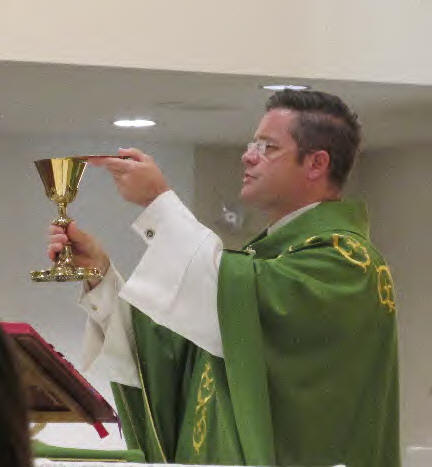 Doxology:
Doxology:
Prayer of Praise:
Through
him, with him, and in him, O God, almighty Father, in the unity of the Holy
Spirit, all glory and honor is yours, for ever and ever.
All: Amen.
Communion Rite
In the Liturgy of the Eucharist, we symbolically offer ourselves to the Lord through the gifts of bread and wine. At the Consecration, we offer our very lives to be united the God the Father through the Cross of Christ. In Communion, we find that we have not died at all, but have come to life. We have surrendered ourselves to God through His Divine Son, Jesus Christ. In return become ennobled and enriched. We give up time and we get eternity, we give up our sin and we receive grace, we surrender our self-will and receive the strength of the Divine Will, we give up ourselves and we receive everything. For the Son of God says to us that unless we receive Him we shall not have Divine life in us. But it is not really we who receive Christ as it is Christ who receives us, bringing us into Himself.
God makes His Cross the very means of our salvation and our life. While we have crucified Him, His eternal love cannot be extinguished. Christ willed to give us the very life we crucified in our Redemption, the Consecration of Holy Thursday into Communion, His death into our everlasting life.
The Lord's Prayer:
Priest: Jesus taught us to call God our Father, and so we have
the courage to say:
Priest and
All: Our
Father, who art in heaven, hallowed be they name; Thy kingdom come; Thy will be
done on earth as it is in
heaven. Give us this
day our daily bread; and forgive us our trespasses as we forgive those who
trespass against us; and lead us not into temptation, but deliver us from evil.
All: For the kingdom, the power and
the glory are yours, now and for ever.
Prayer for Peace:
Priest and All: Lamb of God, you take away the sins of the
world, have mercy on us.
Lamb of God, you take away the sins of the world, have mercy on us.
Lamb
of God, you take away the sins of the world, grant us peace.
Communion of the Priest:
Priest: May this mingling of the body and blood
of our Lord Jesus Christ bring eternal life to us who receive it.
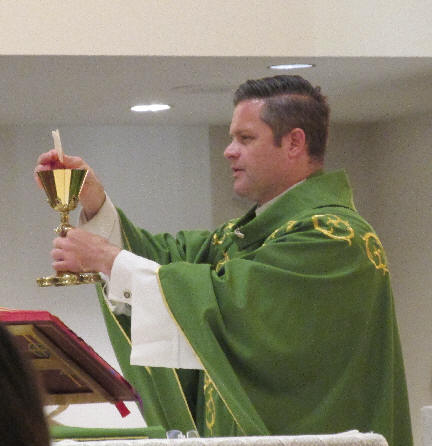 Priestly Preparation: Lord Jesus Christ, Son of the living God, who by the will of the Father and the
work of the Holy Spirit, through
your death gave life to the world. By your holy body and blood free me
from all my sins, and from every evil. Keep me faithful to your teaching,
and never let me be parted from you.
Priestly Preparation: Lord Jesus Christ, Son of the living God, who by the will of the Father and the
work of the Holy Spirit, through
your death gave life to the world. By your holy body and blood free me
from all my sins, and from every evil. Keep me faithful to your teaching,
and never let me be parted from you.
Priest: This is the Lamb of God who takes away the sins of the world. Happy are
those who are called to his supper.
Priest and All: Lord,
I am not worthy to receive you, but only say the word and I shall be healed.
Priest: May the Body of Christ keep me safe for eternal life.
May the Blood of Christ keep me safe for eternal life.
Communion Antiphon:
Psalm 36:8
How precious is your mercy, O God! The children of men seek shelter in the shadow of your wings.
Communion of the Faithful:
Priest:
The Body of Christ.
The Faithful: Amen.
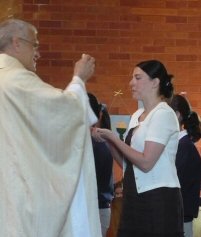
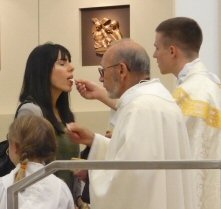
Priest/Deacon/
Extraordinary Eucharistic Minister:
The Blood of Christ.
The Faithful: Amen.
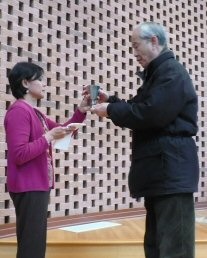
Cleansing of the Vessels:
Priest: Lord,
may I receive these gifts in purity of heart. May they bring me healing
and strength, now and for ever.
Prayer after Communion:
Priest: Let us pray.
Priest: May the working of this heavenly gift, O Lord, we
pray, take possession of our minds and bodies, so that its effects, and not our
own desires, may always prevail in us. Through Christ our Lord.
Concluding Rite
Priest: The Lord be with you.
All: And also with you.
Dismissal Prayer: (The priest may select
from several forms)
Priest: Bow your heads and pray for God's blessing.
Priest: May God bless you with every heavenly blessing, make
you always holy and pure in his sight, pour out in abundance upon you the riches
of his glory, and teach you with the worlds of truth' may he instruct you in the
Gospel of salvation, and ever endow you with fraternal charity. Through
Christ our Lord.
All: Amen.
Blessing:
Priest: May almighty God bless you, the Father, and the Son, and
the Holy Spirit.
All:
Amen.
Sending Forth:
Deacon / Priest:
Go forth, the Mass is ended.
All: Thanks be to God.
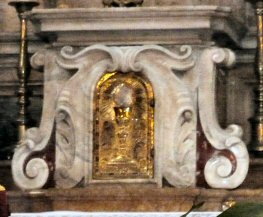 O my Jesus, forgive us our sins.
O my Jesus, forgive us our sins.
Save us from the fires of hell.
Lead all souls to heaven,
especially those in most need of your mercy.
www.Divinemasterplanforlife.com
www.Saintsnheaven.com
Top
Home Page
Liturgical
Year Cycle A 2016-2017